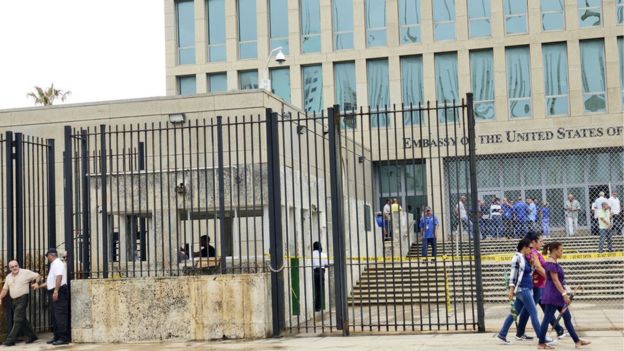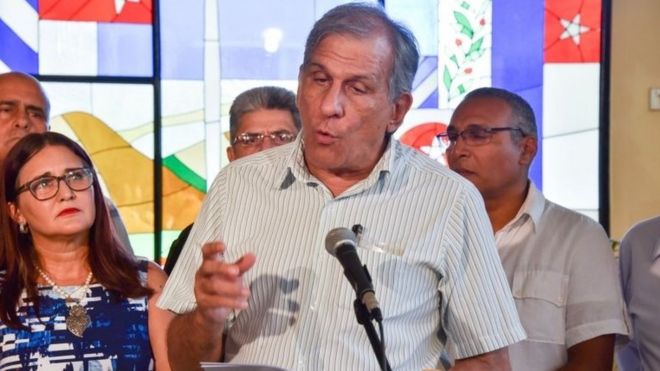And Never the Twain Shall Agree
"People outside keep making claims that this is psychological. This might give them some peace and some vindication that there is something real there and it is not just in their heads."
"Everyone who examined these patients feels this was real from a neurological point of view, that this was a true neurological disorder."
Dr. Douglas Smith, director, Center for Brain Injury and Repair, University of Pennsylvania, Perelman School of Medicine
 |
| The study was based on MRI scans of US diplomats who were in Cuba and their relatives Getty Images |
"In collaboration with Health Canada, a physician is following up with each affected individual to ensure they receive appropriate medical treatment through the Canadian provincial health-care system."The sounds weren't those of crickets, the mind-numbing effects not psychosomatic, the controversial issue of Canadian and American mission staff in Cuba experiencing strangely mystifying exposure to a force of some kind that affected their brains has undergone scrutiny since 'Havana syndrome' first surfaced several years ago with diplomats and their families suffering concussion-like symptoms with no visible signs of traumatic head injury.
"All employees and their families who have reported symptoms have received medical testing in Canada. We are working closely with the Dalhousie University Brain Repair Centre to support further research."
Global Affairs Canada spokesman, John Babcock
Not mass hysteria at all. The cause and motivation remain unknown. But some suspect the injuries could have resulted from directed-energy weapons, like microwaves. U.S researchers have now published a paper in the Journal of the American Medical Association, revealing their finding that advanced neuro imaging had uncovered the presence of differences of a significant quality in the brains of 40 American government personnel.
They had experienced "directional phenomena" while serving in the diplomatic core in Havana. Their brains were compared to those of a control group. The findings, according to Dr. Douglas Smith, one of the authors, represented vindication for the patients treated and studied at the University of Pennsylvania's Perelman School of Medicine which had taken the lead in the matter. Those afflicted with the symptoms of 'Havana syndrome' were made to feel like unreliable imposters.
But it was discovered by the researchers who studied the patients, the presence of significantly smaller brain white matter in the concussion-type symptoms as compared to the control group. Tissue containing nerve fibres connecting parts of the brain and which signal nerves to communicate, is white matter. In the changes identified by researchers, the similarity to the brains of concussion patients were identified. Along with a unique change to the signals helping nerves to communicate.
Researchers found no swelling in the long fibres contained in white matter as would be the case in concussion patients; instead the opposite was found in the Havana patients, possibly indicating that the brains of Havana patients could contain a lower percentage of moisture in their white matter. "These types of changes are truly unique and don't fit any known disorder that we have come across", explained Dr. Smith.
A range of symptoms including eye tracking difficulty, headaches, problems with balance, hearing and cognition difficulties, were experienced by the patients; symptoms that have for most patients resolved, while for others they have continued. Havana syndrome or something quite akin to it has also been experienced by American diplomatic government employees posted to China, and they are similarly being treated at the University of Pennsylvania.
Some of the Canadian diplomats and their family members had travelled to the University of Pennsylvania, paying their own way to do so, in the hopes they too would be examined, only to discover that authorities at the university had been informed by the government of Canada that the Canadians should not be treated there. Since then, Canadian diplomats and their families have been examined and treated at Dalhousie University in Halifax by brain researchers there.
A common experience among those affected were sounds coinciding with the symptoms being experienced. One diplomat posted to Havana in 2017 described waking during the night to a "grinding, screeching, metallic noise" filling the bedroom, that made him nauseous and then his son entered the room with a severe nosebleed. That family experienced headaches, cognitive problems and nosebleeds. On return to Ottawa the diplomat's wife actually 'lost' her sense of direction and was unable to find her way home.
The release and publication of the study's findings has been entirely rejected by Cuban neuroscientists. Who had themselves carried out their own study from their perspective. Cuban authorities have claimed to be as puzzled as American and Canadian researchers over the peculiar events. Prof Mitchell Valdés-Sosa, the Cuban lead scientist, criticized the study's methodology and "inconclusive results".
At a news conference propelled by news of the study results, Professor Valdés-Sosa stated: "the changes in the brain images are very small, very diverse and very diffuse. They do not correspond to a coherent explanation."
 |
| Prof Mitchell Valdés-Sosa of the Cuban Neuroscience Center dismissed the findings of the study AFP |
Labels: 'Havana Syndrome', Canada, Cuba, Diplomats, Research, United States

<< Home